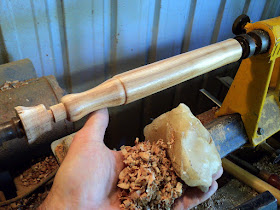When he'd finished, he passed this chisel to me.
Oh my sainted aunt!
The handle was the first clue - birch - and the shape - definitely Swedish. One look at the blade told me it was something special. That same bevelled edged shape has been used by Jernbolaget, Kronan and Erik Anton Berg.
I was ready to weep.
Here it is next to a Berg handle - fresh from the market.
Closer inspection showed it for what it is:
Swedish Toledos are excellent chisels and make fine parers. They are to be cared for, honed and used for the purpose for which they were manufactured - paring, with a razor sharp edge.
Let's check that edge:
Holy opened paint tins Batman!
It's a super-dull maxi-fat-edge chisel, of the non-cut variety.
This looks like a job for the dynamic duo - wire wheel, grinder, oilstones and arkansas stone. (OK quartet!)
A quick cleanup revealed the problems ahead. No serious pitting thank goodness.
................The back needed re-flattening, and the bevel - (what bevel?!!!!!!!!) - needed re-grinding after the edge was squared to the sides.
That poor old handle had been belted so much that it had lost a full half-inch of its length. Furthermore, it was cracked all the way through both sides. Only the ferrules were holding it together.
Time for a new one.
I remove old handles by gripping the blade between scrap leather in my Carter vice, and tapping a suitably sized open ended spanner against the handle. If the handle is worth keeping, I pad the spanner as well - not in this case however.
With an inch of blade already gone, this chisel begged for a longer handle in the Japanese paring chisel style. I'll try to stay true to its Swedish origins with the profile, but there will be no top ferrule. This chisel will never again be struck.
I have chosen a piece of black wattle from my wood-cave for this handle. Black wattle grows wild around here, and is a plentiful, renewable resource. It has some pleasing grain and will serve very nicely. As before, with the Sorby chisel, I have accentuated the length in this handle, as I enjoy the added control that this imparts to the chisel when paring.
A coat of beeswax and a quick polish with a handful of shavings, and the handle is complete.
Here is the finished article: one Toledo Steel - Made in Sweden - Bevelled Edge Paring Chisel!
Once again, a good test of the keen-ness of the blade, is how well it pares end grain.
 Not too shabby at all!
Not too shabby at all!Now that is a real feel-good ugly duckling story.
I'll have to find another beater of a chisel for my son to return to his shed. Something with a plastic handle this time. Hee hee! This one can become his going out chisel, only to be used on Sundays.......
May all your uglies turn into swans, and all your problems be small ones ...............
....... and happy woodworking to all ...............











I've got a set of Toledo's that were my dad's and they are every bit as good as the Berg's I've had. I think there may actually be another spare toledo blade kicking around somewhere so will dig it out and send it to you if you'd like it
ReplyDeleteCheers
Andrew
You are a champion good sir.
DeleteWould love it.
Kippis
Tom